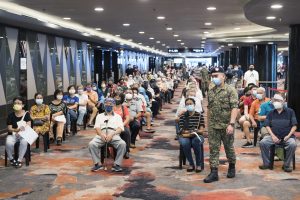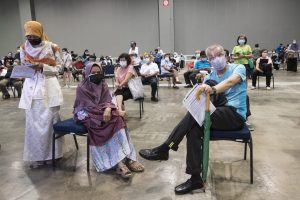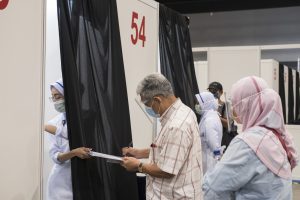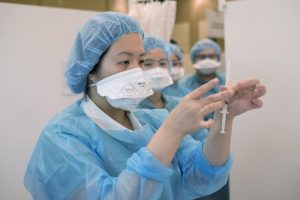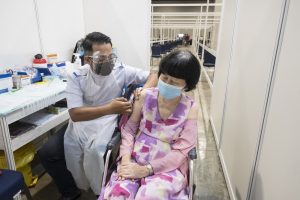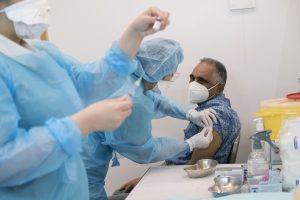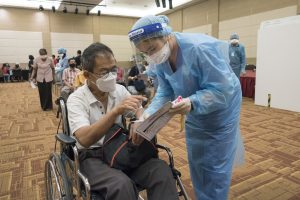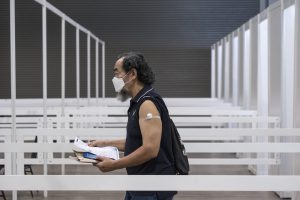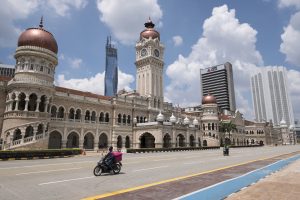As Malaysia sees a surge of COVID-19 infections, surpassing India in terms of infection rate per capita, the government imposed a strict lockdown to run from June 1 to June 14. Malaysia’s health care system is overloaded already, and the government is speeding up the pace of its national vaccination program. As of June 7, Malaysia had recorded more than 622,000 cases of COVID-19, with the rolling seven-day average of new cases peaking on June 3 at 7,736 per day.
The new wave of infections comes in the wake of the Eid al-Fitr celebrations during which many Malaysians flouted the regulations set in place by the government for the festive season. It has also been fueled by the circulation of more contagious COVID-19 variants. This represents the peak of the pandemic for a country which managed to maintain relatively low rates of infection until May.
The vaccination campaign, which initially began on February 24 progressed slowly until the end of May because of an erratic supply of vaccines, the government said. On June 4, 100 days into the process, the country reached a delivery rate of 117,563 vaccines per day, a dramatic increase from the initial 5,000-8,000 vaccines per day. Malaysia, which has vaccinated 7.2 percent of its population, last week surpassed the vaccination rate of other Southeast Asian countries including Indonesia, Thailand, and Vietnam, but is still behind Singapore, Cambodia, and Brunei.
“Today, Malaysia’s first-dose vaccination rate is among the highest in Southeast Asia,” Prime Minister Muhyiddin Yassin said on June 5 while addressing the nation in a Facebook live broadcast marking 100 days since the start of the National Immunization Program. “This achievement is not an easy feat because the supply of vaccines is beyond our control. Malaysia needs to compete with other countries and rely on vaccine manufacturers for supplies.”
As more vaccines are delivered into the country, the vaccination rate is targeted to reach 200,000 shots per day by the end of July.
“For the next two months, we will receive approximately 16 million doses of COVID-19 vaccine. With the increase in the supply of these vaccines, the government is targeting the daily vaccination rate to reach 150,000 this month and this figure will continue to increase,” Muhyiddin said.
In a bid to increase the vaccine supply, the government approved AstraZeneca’s COVID-19 vaccine, manufactured by Siam Bioscience in Thailand. Health Ministry Director-General Noor Hisham Abdullah said in a statement on June 4 that the vaccine supply from Thailand “will be the main source of AstraZeneca vaccines for use in the National COVID-19 Immunization Program in the country.”
Malaysia, which previously received two batches of AstraZeneca vaccines, had initially diverted the vaccine into a parallel, voluntary, first-come-first-served vaccination scheme, after reports of rare blood clots. As hundreds of thousands of Malaysians struggled to register online for the AstraZeneca vaccine, the $17 million online national vaccination registration and tracking portal experienced multiple flaws, including the inability to handle a large number of applicants simultaneously. The second online registration window for the AstraZeneca vaccine, open for 90 minutes, saw nearly 1 million doses booked. But it prompted many who couldn’t register to express their frustration on social media and question the efficacy of the centralized online registration process.
After the overwhelming response to the AstraZeneca voluntary registration option, the government added the vaccine back into the National Immunization Program.
Until the end of May, the vaccination process occurred almost exclusively in government vaccination centers. The initial, smaller centers were merged into mammoth vaccination facilities that processed thousands of people daily. With crowds waiting their turn outside the centers, concerns were raised over the spreading of infections during the vaccination process itself. The Federation of Private Medical Practitioner’s Associations Malaysia (FPMPAM) called for a decentralization of the vaccination process.
“We need to have more centers for the population to get their vaccine including all Klinik Kesihatan [local health clinics], all hospitals and all GP clinics. We don’t need ‘supersport-style’ vaccine centers. (…) The present overcrowding and long wait in massive vaccination centers itself is potentially a superspreader opportunity for the virus,” Dr. Steven K.W. Chow, president of FPMPAM, said in a press statement issued on May 29. “It is also not necessary to have the a digitalized system that is not able integrate all the moving parts. We need people to go to their doctors and have their jabs on the spot,” he added, calling for a simplification of the current vaccine registration system.
With more vaccines anticipated to be readily available in the near future, the government is adding private clinics and hospitals as vaccination centers in the National Immunization Program.
“To further accelerate the roll-out of vaccination programs, the government has also involved Private Medical Centers and Clinics in this national vaccination program. By the end of June 2021, a total of 1,000 Private Medical Clinics or PPVGP are targeted to be involved in PICK [the National Immunization Program],” said Prime Minister Muhyiddin on June 5.
Medical experts, who voiced their concerns repeatedly, have long called for such a decision to devolve vaccination away from mega-sites.
“We urge the government to also establish partnerships with private hospitals so all hands can be on deck to ensure available vaccines are administered as soon as possible,” the Malaysian Health Coalition, an apolitical coalition of medical professional societies, health professionals, and citizens, said in a press statement on March 11.
On May 31, the doors of the first vaccination centers in private hospitals and clinics were opened to the public. Dr. Seow Vei Ken, medical director of one of the private hospitals included in the National Immunization Program, welcomed the measure, saying that good cooperation between the public and private sectors will expedite the administration of vaccines.
“Our country can not afford to keep the lockdown much longer because it will have a very big damage on the economy, so the faster we can achieve herd immunity, the country can restart all the economic sectors again. This is a way to strike a balance between life and livelihoods,” he said. “For now our capacity is 400 vaccines per day for the elderly patients. Some of them come with the wheelchair, they move a bit slow. Because we need to take good care of them we can not do it in a very fast pace, but after this round we are trying to ramp up the numbers to 600 or even 800 in the near future. We will do everything to increase our capacity and expedite the whole process,” he added.
Vaccination centers set up in urban areas are often not an easily accessible option to some elderly people and people with disabilities, or those who don’t own personal modes of transportation. Starting from June 3, the government has set up mobile vaccination clinics in nine states to reach populations that might not have easy access to vaccination centers. The mobile vaccination units are able to reach people in rural areas, government social housing in urban areas, and nursing homes. “This is to facilitate the vaccination process for villagers, indigenous people, the elderly, the disabled and the homeless,” Muhyiddin said on June 5.
With all these measures, the government is aiming to vaccinate 80 percent of the population and obtain herd immunity by the end of the year.













